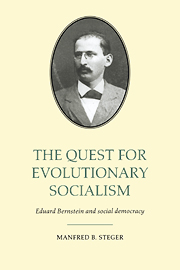Book contents
- Frontmatter
- Contents
- Acknowledgments
- List of abbreviations
- Introduction: the nature of Bernstein's quest
- Part 1 Preparation
- Part 2 Vision
- Part 3 Disappointment
- 6 Facing the critics
- 7 The revisionist debate extended
- 8 The dawn of a new era
- 9 Bernstein's final battle: confronting socialist instrumentalism
- Epilogue: evolutionary socialism at the “end of socialism”
- Select bibliography
- Index
7 - The revisionist debate extended
Published online by Cambridge University Press: 06 October 2009
- Frontmatter
- Contents
- Acknowledgments
- List of abbreviations
- Introduction: the nature of Bernstein's quest
- Part 1 Preparation
- Part 2 Vision
- Part 3 Disappointment
- 6 Facing the critics
- 7 The revisionist debate extended
- 8 The dawn of a new era
- 9 Bernstein's final battle: confronting socialist instrumentalism
- Epilogue: evolutionary socialism at the “end of socialism”
- Select bibliography
- Index
Summary
The lessons of the Dresden Party Conference
The danger of new anti-socialist measures having subsided under the new chancellor, Prince Bernhard von Bülow, Bernstein's hopes for a genuine liberalization of German politics were considerably heightened. Mostly, he continued to rely on his revisionist assumption that, under the conditions of modern capitalism, the middle classes would grow in number and complexity. Such development would translate into greater social wealth and social security, which, in turn, would develop the civic consciousness of the middle class, making its members more open to socialist demands for redistribution of the social product and the abolition of class privilege. At the same time, steady economic growth would improve the conditions of the working class and lift their educational and social status. Scores of workers would soon join the expanding lower middle class to form a “new middle class” whose progressive political agenda would eventually result in the transformation of Prussian authoritarianism.
But Bernstein's evolutionary optimism, based on the belief that the rising “new middle class” would be more susceptible to social democratic ideals, was neither to be fulfilled in the context of the Wilhelmine Empire nor during the fourteen years of the Weimar Republic. Rather, the growing segments of white-collar workers, state and municipal officials, and salaried employees tended to be attracted by the nationalistic and anti-Semitic ideology of the national-liberals, the Catholic Centre Party, and, ultimately, Hitler's NSDAP.
- Type
- Chapter
- Information
- The Quest for Evolutionary SocialismEduard Bernstein and Social Democracy, pp. 176 - 204Publisher: Cambridge University PressPrint publication year: 1997



